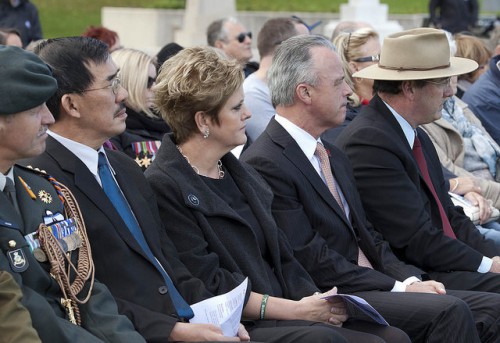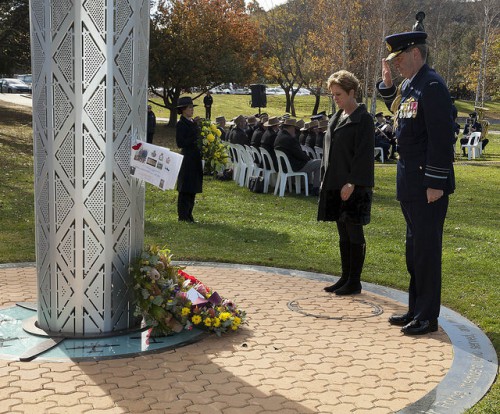10th June 2015 Canberra, Australia
Reflections on remembrance
Before I came to Australia, someone said to me: “You’ll lay a lot of wreaths”. The comment recognised, I think, an Australian paradox that I’ve also noticed now I’m here: how a nation which is so informal and at ease with itself can also be attached to the art of the ceremony and the more formal aspects of national life*.
In my first two months in Australia, I’ve laid three wreaths, all at the Australian War Memorial here in Canberra. Hardly excessive. The surprise hasn’t been the laying but the impact this has had on me, connecting me emotionally with events in my own country’s history.

Picture courtesy of the Australian War Memorial
Last weekend, I laid a wreath at the memorial for the 1,781 Australian who died during the Sandakan ‘death marches’ in Borneo during World War II. 641 Brits also lost their lives; only six Australians who had managed to escape survived. And on Sunday I did the same to recognise those Australians who played their part in the RAF’s bombing campaign in Europe during World War II. 3,486 died in action.
On both occasions, standing alongside Brendan Nelson and other dignitaries, I had a big lump in my throat, listening to personal stories of those involved.
At the Sandakan memorial, I heard the son of Richard (Dick) Braithwaite – one of the six survivors – talk about how his Dad had never managed to leave the war behind him through his life. He was forever in touch with relatives of his comrades to try to provide information and, where possible, reassurance about how their loved ones had died.
At the Bomber Command Ceremony, I sat with my husband and our son and listened to the story of one of the WWII veterans, who shared his luck in surviving 35 bombing raids and a spell as a Prisoner of War. He recalled hearing colleagues ‘going down’ in another plane, their radio set still transmitting until the moment of impact.

Picture courtesy of the Australian War Memorial
Apart from battling my own emotional reaction to these sad and brave stories, I took away a few other things.
First, the history of our people in Australia and the UK really is intertwined in ways which will resonate through the generations. In life and in death we have stood side by side in defence of freedom, democracy and shared values. These connections underpin the strength of our modern-day relationship.
Second, the value of still being able to hear from those who were there. It feels an enormous privilege to listen to first-hand accounts of a war that is receding into our past, recognising that these will soon be gone. We will need to rely increasingly on stories passed down through the generations – and keep listening to more recent accounts from those who have served, including in Afghanistan, Iraq, East Timor and Vietnam.
Third, that you Aussies do this stuff better than us Brits. Perhaps it is that attachment to history that creates such a strong focus on Anzac Day and other commemorative events. But you make history relevant by giving voice to personal stories and experiences and not shying away from the emotional impact of war.
One of the great pleasures of being a diplomat is learning from other countries, as well as sharing our own knowledge and view of the world. In this case, I have learned how to remember, and to reflect much more deeply on the sacrifices made my parents’ and grand-parents’ generations in laying the foundations of our lives today. Thank you.
* For anyone who is a fan of Hofstede’s indices of national culture, the only big differences between the UK and Australia are that Australians are a) less tolerant of uncertainty and ambiguity and b) more attached to their history and a long-term view of the past. That might be a topic for another blog! But for now – check out the analysis here: http://geert-hofstede.com/australia.html.)